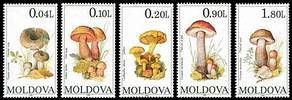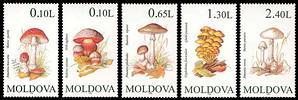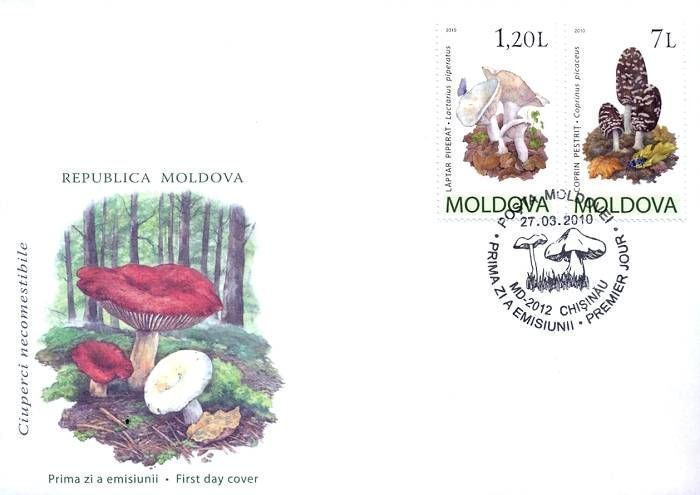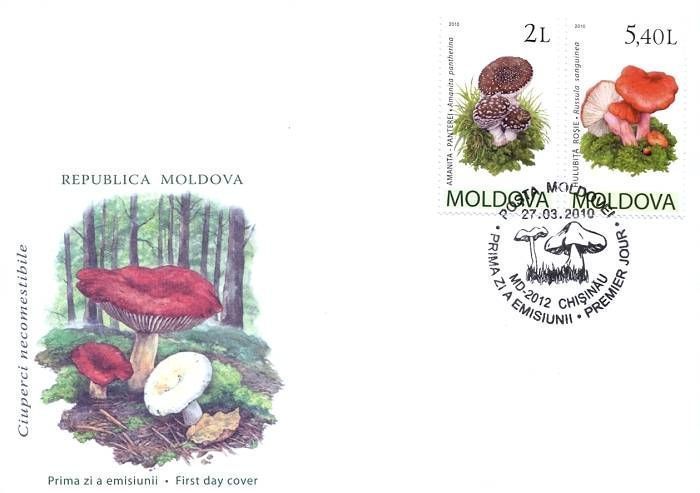POSTAGE STAMPS
|
|
Peppery Milk-cap (Lactarius Piperatus)
- Michel Catalogue No: 694
- Perforation Type/Size: Comb 14.50:14
- Size: 27.50 x 46.00 mm
- Face Value: 1.2 Lei
- Quantity Printed: 220,000
|
Lactarius piperatus, commonly known as the peppery milk-cap is a semi-edible basidiomycete fungus of the genus Lactarius. Despite being edible, it is not recommended due to its poor taste, though can be used as seasoning when dried. The fruiting body is a creamy-white mushroom which is funnel-shaped when mature, with exceptionally crowded gills. It bleeds a whitish peppery-tasting milk when cut. Widely distributed across Europe and eastern North America, Lactarius piperatus has been accidentally introduced to Australia. Mycorrhizal, it forms a symbiotic relationship with various species of deciduous tree, including beech, and hazel, and fruiting bodies are found on the forest floor in deciduous woodland. Read more..
This article uses material from the Wikipedia article 'Lactarius_piperatus', which is released under the Creative Commons Attribution-Share-Alike License 3.0. |
| |
|
Panther Cap (Amanita Pantherina)
- Michel Catalogue No: 695
- Perforation Type/Size: Comb 14.50:14
- Size: 27.50 x 46.00 mm
- Face Value: 2 Lei
- Quantity Printed: 120,000
|
Amanita pantherina var. pantherina, also known as the panther cap and false blusher due to its similarity to the true blusher (Amanita rubescens), is a species of fungus found in Europe and Western Asia. Read more..
This article uses material from the Wikipedia article 'Amanita_pantherina_var._pantherina', which is released under the Creative Commons Attribution-Share-Alike License 3.0. |
| |
|
Bloody Brittlegill (Russula Sanguinea)
- Michel Catalogue No: 696
- Perforation Type/Size: Comb 14.50:14
- Size: 27.50 x 46.00 mm
- Face Value: 5.4 Lei
- Quantity Printed: 70,000
|
Russula sanguinaria, commonly known as the bloody brittlegill, is a strikingly coloured mushroom, a member of the Russula genus, which has the common name of brittlegills. It is bright blood-red, inedible, and grows in association with coniferous trees. It was previously widely known as Russula sanguinea. Read more..
This article uses material from the Wikipedia article 'Russula_sanguinaria', which is released under the Creative Commons Attribution-Share-Alike License 3.0. |
| |
|
Magpie Fungus (Coprinus Picaceus)
- Michel Catalogue No: 697
- Perforation Type/Size: Comb 14.50:14
- Size: 27.50 x 46.00 mm
- Face Value: 7 Lei
- Quantity Printed: 70,000
|
Coprinopsis picacea is a species of fungus in the Psathyrellaceae. It is commonly called Magpie Fungus. It is native to Britain. It was first described in 1785 by French mycologist Jean Baptiste François Pierre Bulliard in 1785 as Agaricus picaceus. This poisonous species can sometimes be confused with the edible Coprinus comatus. Read more..
This article uses material from the Wikipedia article 'Coprinopsis_picacea', which is released under the Creative Commons Attribution-Share-Alike License 3.0. |
| |









No comments:
Post a Comment